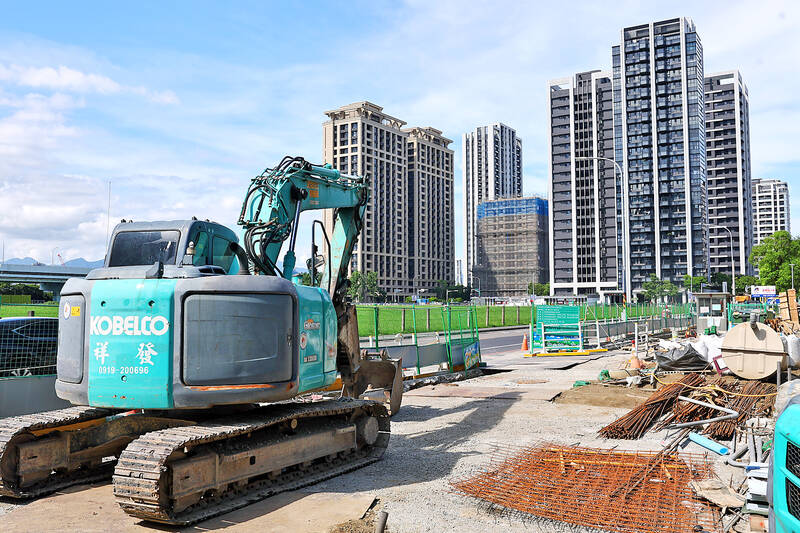The Cabinet yesterday gave the go-ahead to measures to restrict favorable lending terms for first-home purchases to once per person and require borrowers to sign an affidavit stating the house is intended for self-occupancy.
The tightened requirements came amid rising concerns over dummy buyers and misuse of loans, as mortgage operations have soared to new highs and home prices have increased by double-digit percentage points across Taiwan.
“The restrictions will go into practice immediately,” Deputy Minister of Finance Frank Juan (阮清華) told a media briefing in Taipei, adding that state-run lenders would closely review loan applicants to root out dummy buyers and property investment.

Photo: CNA
Surveys have showed that favorable lending terms introduced in August last year have revived a property boom, as they allow first-home buyers an interest rate of 1.775 percent, a five-year grace period and mortgages of up to 40 years.
Investors and wealthy people have allegedly used dummy buyers, including their children, to take advantage of the program designed to help people with real demand to buy a home, Juan said.
State-run lenders would tighten reviews of loan applications from the same household and ask borrowers to pledge that they would not lease the house, which would be against the self-occupancy requirement, he said.
People found to have contravened the rules would have their interest subsidy revoked and must return the difference, he said.
Furthermore, favorable lending terms are limited to once per person, meaning that those who sell a home purchased under the program would not qualify to apply again, Juan said.
As of May 31, the program had aided 57,980 house purchases, with combined mortgages totaling NT$428.1 billion (US$13.16 billion), the ministry said.
Houses valued at under NT$15 million accounted for 78.2 percent of the deals, while 72.99 percent of the people who took out the mortgages were 40 or younger, implying that the program effectively benefitted target buyers and should not be held responsible for rising house prices, Juan said.
Mortgages of 31 to 40 years constituted 50.01 percent of homes bought under the program, while floor areas of 16 ping to 45 ping (48.9m2 to 148.8m2) accounted for 67.76 percent of the homes, he said.
The interest subsidy had cost the state coffers NT$1.78 billion and the government would set aside more money to sustain the program until it expires in 2026, Juan said.
State-run lenders have identified suspect cases and would crack down on abuse of the program, he added.
Real-estate brokers said that the three-year interest subsidy and five-year grace period provide sufficient room for profit-taking for people who cannot afford mortgages.

The Ministry of Foreign Affairs (MOFA) yesterday said it is closely monitoring developments in Venezuela, and would continue to cooperate with democratic allies and work together for regional and global security, stability, and prosperity. The remarks came after the US on Saturday launched a series of airstrikes in Venezuela and kidnapped Venezuelan President Nicolas Maduro, who was later flown to New York along with his wife. The pair face US charges related to drug trafficking and alleged cooperation with gangs designated as terrorist organizations. Maduro has denied the allegations. The ministry said that it is closely monitoring the political and economic situation

Conflict with Taiwan could leave China with “massive economic disruption, catastrophic military losses, significant social unrest, and devastating sanctions,” a US think tank said in a report released on Monday. The German Marshall Fund released a report titled If China Attacks Taiwan: The Consequences for China of “Minor Conflict” and “Major War” Scenarios. The report details the “massive” economic, military, social and international costs to China in the event of a minor conflict or major war with Taiwan, estimating that the Chinese People’s Liberation Army (PLA) could sustain losses of more than half of its active-duty ground forces, including 100,000 troops. Understanding Chinese

UNRELENTING: China attempted cyberattacks on Taiwan’s critical infrastructure 2.63 million times per day last year, up from 1.23 million in 2023, the NSB said China’s cyberarmy has long engaged in cyberattacks against Taiwan’s critical infrastructure, employing diverse and evolving tactics, the National Security Bureau (NSB) said yesterday, adding that cyberattacks on critical energy infrastructure last year increased 10-fold compared with the previous year. The NSB yesterday released a report titled Analysis on China’s Cyber Threats to Taiwan’s Critical Infrastructure in 2025, outlining the number of cyberattacks, major tactics and hacker groups. Taiwan’s national intelligence community identified a large number of cybersecurity incidents last year, the bureau said in a statement. China’s cyberarmy last year launched an average of 2.63 million intrusion attempts per day targeting Taiwan’s critical

‘SLICING METHOD’: In the event of a blockade, the China Coast Guard would intercept Taiwanese ships while its navy would seek to deter foreign intervention China’s military drills around Taiwan this week signaled potential strategies to cut the nation off from energy supplies and foreign military assistance, a US think tank report said. The Chinese People’s Liberation Army (PLA) conducted what it called “Justice Mission 2025” exercises from Monday to Tuesday in five maritime zones and airspace around Taiwan, calling them a warning to “Taiwanese independence” forces. In a report released on Wednesday, the Institute for the Study of War said the exercises effectively simulated blocking shipping routes to major port cities, including Kaohsiung, Keelung and Hualien. Taiwan would be highly vulnerable under such a blockade, because it